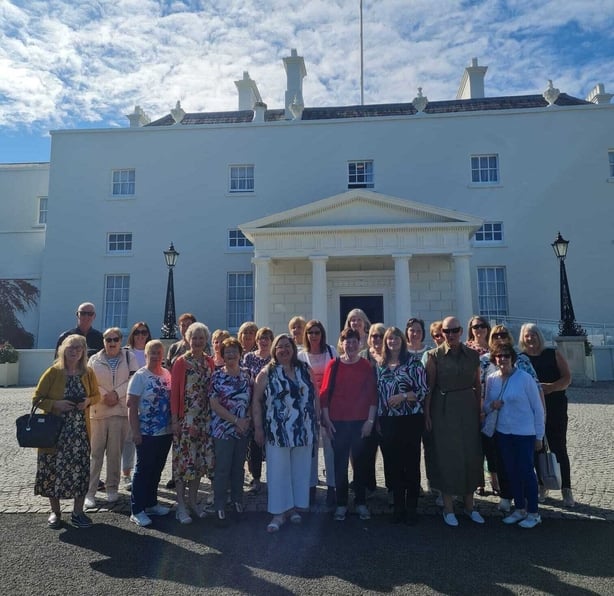Analysis: You've heard of the men's sheds movement, but there are also around 120 women's sheds in operation across Ireland right now
Ireland has long been known for its strong sense of community. With one of the highest rates of volunteering in Europe, community groups play a vital role in people’s lives, especially in rural areas. Beyond social benefits, community involvement contributes to mental well-being, social connection and a sense of belonging. These benefits are now increasingly recognised by health professionals who refer patients to community groups in a practice called Social Prescribing.
Women's sheds are emerging as an important part of this landscape in Ireland by providing a space where women of all ages and backgrounds (but primarily older women) meet regularly to share skills, learn from experts, do creative activities or simply have a cup of tea and a chat.
We need your consent to load this rte-player contentWe use rte-player to manage extra content that can set cookies on your device and collect data about your activity. Please review their details and accept them to load the content.Manage Preferences
From RTÉ Radio 1's Ray D'Arcy Show, live from Mungret St. Balls GAA club in Limerick with the Limerick Women's Shed
Today, there are around 120 women’s sheds across Ireland, and the movement has perhaps been accelerated by the increasing social isolation and disconnection left in the wake of the Covid-19 pandemic. Margaret Murphy of Ballinrobe Women's Shed highlights their role: "women’s sheds are developing and gaining momentum. They have the potential to become powerful community hubs that promote lifelong learning, a strong support network, and reduce isolation."
Despite their growing popularity, women’s sheds face structural and societal challenges. Sheila K. Martin of Phoenix and Killarney Women's Sheds describes the disparities between men’s and women’s sheds. "Most women’s sheds rent shared spaces, meaning they must pack away their equipment after each session. Men’s sheds, on the other hand, are often granted permanent spaces. Achieving recognition and funding has been a slow process, despite the increasing demand.
"It took several years to convince the government that not supporting Women’s Sheds in the same manner as Men’s Sheds was against the Equal Status Act. Many of us wrote letters to TDs and ministers on this issue, and we have now secured designated funding under the Community Enhancement Programme, but funding disparities remain a challenge."
We need your consent to load this rte-player contentWe use rte-player to manage extra content that can set cookies on your device and collect data about your activity. Please review their details and accept them to load the content.Manage Preferences
From RTÉ Radio 1's News at One in 2022, funding to be made available for growing network of Women's Sheds across the country
As a researcher in Social and Community Psychology, I wanted to understand the ripple effects of social collaboration in individuals and communities and especially grassroots initiatives like Women's Sheds, which centre on mutual aid and collective well-being. In September 2024, I began a two-year Research Ireland Postdoctoral Fellowship at the University of Limerick, conducting a community-based participatory evaluation of the women’s shed movement in Ireland. Along with my research mentor, Prof Ronni Greenwood, and a Community Advisory Board comprising nine Women’s Shed organisers from across Ireland, our goal is to explore the movement’s multi-level effects.
Laura Costello from North Wicklow Women's Shed believes such research is an opportunity to shape the movement’s future, "I feel we will be recognised on a national level. Our mission statement can express the important work we are undertaking and the wealth of positive outcomes we can have for our local communities and the country as a whole."
Ongoing research combines qualitative case studies of four Women’s Sheds, a nationwide survey, and a Photovoice project. While still in its early stages, consultations with Community Advisory Board members have revealed the significant impact of Women’s Sheds on social connection, well-being, and community-building.

Members have strong visions for the future of women’s sheds. Margaret Murphy sees this research as an opportunity to expand the movement: "It can highlight the importance of women’s sheds as safe places that promote social connection and well-being. It may help influence policymakers and funders to invest in women’s sheds, ensuring their growth and reducing isolation."
Sheila K. Martin emphasizes the role of "place making" in fostering a sense of belonging. "Communities function best when people feel connected. People used to use pubs for that, but many have shut down. Women’s Sheds can fill that gap, providing a dedicated space where women can share experiences, build friendships, and feel part of something bigger."
Women's sheds offer a powerful model for fostering connection and resilience
Inclusivity is another key pillar of the movement. Laura Costello envisions women’s sheds as spaces for all women, regardless of age or background. "My vision is for women’s sheds to be welcoming and supportive, a place where women feel comfortable expressing their thoughts and needs, sharing experiences, and most importantly—just having fun together."
Beyond academic contributions, this research will provide an evidence base for the development and sustainability of women’s sheds and similar groups that offer valuable social connection, empowerment, and skills development for women nationwide. As Ireland continues to navigate social and economic changes, women’s sheds offer a powerful model for fostering connection and resilience. With the right support, they have the potential to grow into a nationwide network that empowers women and strengthens communities. This research will contribute to making that vision a reality.
Follow RTÉ Brainstorm on WhatsApp and Instagram for more stories and updates
The views expressed here are those of the author and do not represent or reflect the views of RTÉ



